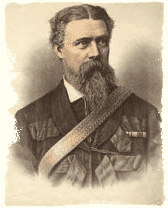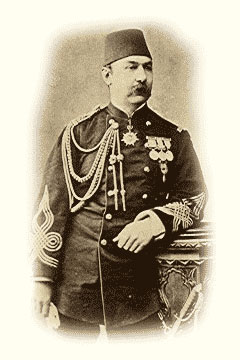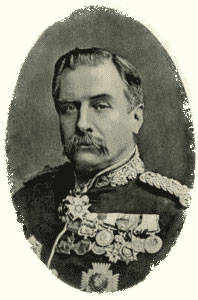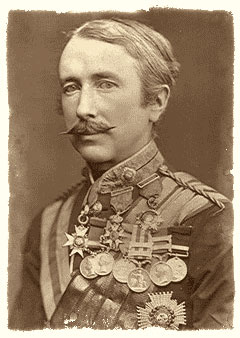
Colonel (Brevet General) William Hicks Pasha
Aged 53, you retired from the Indian army in 1880 after a largely uneventful career, despite being mentioned in despatches for good conduct at the action of Sitka Ghaut during the mutiny and acting as brigade major in the Abyssinian expedition. Life in Brighton was rather more expensive than you anticipated (Mrs Hicks having expensive tastes) and the damp weather made your arthritis worse, so you took the opportunity to enter the Khedive’s service after the Egyptian war of 1882.

Despite severe reservations about the quality of the men and their officers under your command, you have worked hard to make something of them. The Sudanese are the most reliable, the cavalry and artillery quite sound but the typical Egyptian Fellah (infantryman) still leaves much to be desired. Recent minor victories over the rebels have bolstered morale somewhat and continued pressure on the enemy is essential if the rebellion is to be suppressed, preferably without the need for British intervention. A successful conclusion to the campaign could lead to personal advancement and greater financial rewards.
Technically you are Chief of Staff to Suleiman Niazi Pasha, Commander of the Egyptian army of occupation in the Sudan, but he is an ineffectual, interfering and cowardly politician with no military experience who is usually happy for you to run things on his behalf.
You get on well with Valentine Baker, Commandant of the Gendarmerie and one of the nicest men you have met, but relations are strained with the British field commanders, particularly Wolseley, who makes his distaste for Indian army officers most evident. You are determined to demonstrate that you are their professional equal, particularly in a region that remains unfamiliar to them.
There remains a nagging doubt at the back of your mind that this appointment may be beyond your capabilities, especially if the Egyptian bureaucrats continue to conspire against you, but you must ignore such anxieties. Sir Evelyn Wood, recently appointed Sirdar (Commander in Chief) of the Egyptian army is being supportive, although Baker has warned you not to trust him, being one of Wolseley’s circle. Above all, be determined, be bold, prove you are not a ‘has-been’ and make Sarah proud of you!
Valentine Baker Pasha, Commandant-General of the Gendarmerie

Aged 57, married with 2 daughters. The younger brother of the famous explorer, Sir Samuel Baker, you are a gifted and dashing cavalry officer who, after service in the Crimean War, rose to become Colonel of the 10th Hussars in 1860. A military innovator, you made the regiment one of the best in the army and wrote extensively on strategy and tactics, having witnessed the Prussian wars against Austria and France and seen the dangerous rise of Russian influence in central Asia. The next 13 years saw your reputation rise as a military theorist, traveller, publisher and writer. The Prince of Wales was a personal friend. Early promotion to senior rank seemed inevitable, with an appointment to the General Staff in 1874.
Then it all went horribly wrong. There was a misunderstanding with a young woman in a railway carriage. In the trial that followed it would have been quite wrong to impugn the lady’s honour and question the veracity of her evidence. You therefore maintained a dignified silence and were subsequently sentenced to a year’s imprisonment and a fine. Your critics and rivals then ensured that the Queen herself insisted that you be dismissed from the service.
Since then, you have served with distinction in the service of Turkey in the war with Russia, commanding a division of infantry and the rearguard at Tashkessan. Two years ago, in 1882, you were offered command of the newly formed Egyptian army, following that country’s effective annexation by Britain (though nominally still under Turkish suzerainty), an opportunity you accepted in order to prove yourself worthy of restoration to the Army List. On arrival in Cairo, however, the offer was cruelly withdrawn (at the instigation of your enemies) and General Woods, a favourite of General Wolseley, installed in your place. Accepting the lesser role as Commandant of the Gendarmerie seemed the only option and you have dedicated the last two years to improving their efficiency, with some success.
Renewed British involvement in the Sudan offers, once again, the opportunity to redeem your good standing. While unrealistic to expect to take command of British forces, heroic leadership, support for Gordon (an influential man) and military success can only help your restoration to your proper position in British military society.
You should insist on a more prominent role in the suppression of the revolt than Hicks who, though nominally your superior, and a well intentioned chap, is a tired, worn-out old ‘India hand’. Do not trust Wolseley or any others of his ‘ring’ of trusted officers, including Earle and Buller. Graham appears more sympathetic. Gordon must be saved even if Khartoum cannot be held against the Mahdi. Above all, be heroic!
General Sir Gerald Graham

Aged 53, six foot four and heavily built, utterly fearless, with a distinguished service history in the Royal Engineers, serving in the Crimean War (where you were wounded twice and was awarded the VC for gallantry under fire) and the China War of 1860 (wounded again). More recently you commanded a brigade during the Egyptian War of 1882, fighting in the battles at Kassassin and Tel-el-Kebir where your men had a decisive role in securing victory.
After Wolseley, you are the senior British officer commanding the expeditionary force to the Sudan. Although you admire him and were happy to serve under him in Egypt, you have never been one of his ‘ring’ of close confidants and associates. You know he is ambitious and seeks public acclaim, while you are a more down to earth character, of a retiring and reserved disposition. It has always been an issue with Wolseley that he was passed over for a VC in the Crimea, while you were honoured. If at all possible, you are determined to have your own independent command in this campaign, to better demonstrate your capabilities as a field officer and avoid any confrontations with your irascible professional rival.
You petitioned the War Office to take part in this expedition. ‘Chinese’ Gordon is a man you admire hugely and must not be abandoned. In your opinion, an expedition from Suakin via Berber offers both the most direct route to Khartoum and also the most effective means of bringing the rebellious Sudanese tribes to heel. Wolseley favours advancing up the Nile, which is twice as far and beset with difficulties. He must not be allowed to divert too many troops to this hare-brained scheme, but outright confrontation between you must be avoided.
Of the subordinate officers, Earle is clearly one of Wolseley’s ring, as is Buller, but both are fine, dependable officers. Stewart is a somewhat impetuous cavalryman, but brave. John Davis is considered an eccentric Irishman, but generally sound. Of the Egyptian officers, Hicks appears a genial old stick, forever worrying about money and Egyptian bureaucracy. You like and admire Valentine Baker and, together with Colonel Burnaby, are keen to see him restored to the British service – success in this campaign may help him achieve this end.
This campaign offers you the best chance of the recognition that you deserve (and that does not mean foolish music hall ditties). Seize the opportunity to impress Mr Gladstone!
General Sir Garnet Wolseley

Raised in impecunious circumstances, a lifetime of military service has seen you become both a popular hero and “the very model of a modern Major-General”. Wounded several times in your early career, in Burma and the Crimea (where you lost the sight of your right eye and were recommended for the VC) you have always been widely regarded as a talented, resourceful and energetic officer. Service in Canada during the Fenian invasion of 1866 and leading the Red River expedition of 1870 provided you with invaluable experience under difficult and varied conditions. In recent years you successfully concluded the Ashanti campaign, brought the Zulu war to an end by capturing Cetewayo (ala Cetshwayo) and commanded the victorious British army in Egypt in 1882 as well as promoting reforms and increased efficiency in the War Office as Quartermaster-General and then Adjutant-General. Forced by lack of wealth to make your own way in the army, you are identified with the progressive element in the British army and a prominent supporter of the Cardwell reforms.
As a result, you are the Empire’s ‘trouble-shooter’, who delights in the use of troops in unconventional roles, with an incomparable reputation for military innovation, organisation and planning, whose name is a by-word for military efficiency. Officers who have served with you are fiercely loyal and you increasingly rely on them (informally known as ‘Wolseley’s ring’) to be your staff and subordinate commanders whenever possible.
You are, obviously, the ideal person to command the British expedition to suppress the Mahdist revolt in the Sudan. Thank goodness General Roberts was kept in India, where he belongs. Graham and Earle are dependable, if unimaginative, but both are also ambitious men, keen to be recognised. Technically, Graham is your equal, unless under your direct command. At least the loyalty of Buller and Stewart can be relied upon, having seen service with you before (still a pity Creed Russell was not available to command the cavalry, though). John Davis is a mad Irishman best kept out of the thick of it.
Of the two senior field commanders of the Egyptian army, the less said, the better – Hicks was clearly unfit to be a Colonel in the Indian army and Baker, while a talented light cavalry officer, is a rogue – the sooner Evelyn Wood, another member of the ring who has recently been appointed Commander in Chief of the Egyptian army (a thankless task), starts making changes, the better. Gordon is rather unhinged but a good man, beloved by the British public (but not as much as you are – he has never been mentioned in a popular music hall song, for example) and must be rescued.
It is perfectly evident to anyone with the slightest appreciation of military planning and logistics that an expedition up the Nile from Wadi Halfa into the heart of the Sudan offers the best chance of successfully suppressing the rebellion. The innovative use of boats and camels will enable the BEF to strike swiftly and decisively. Anything less daring should be treated with contempt and left to the ditherers. Although the Suakin to Berber route is shorter, the march is across arid desert and quite impassable to formations of more than 5000 men. Action on this front, while desirable, can only be a diversion to tie down enemy troops and prevent their concentration on the main expedition, which you, of course, will lead.
One thought on “Fire & Sword in the Sudan: Player Briefings”